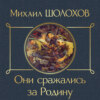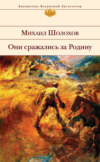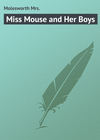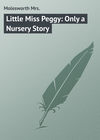Читать книгу: «Hoodie»
CHAPTER I.
AT WAR WITH THE WORLD
"Who would think so small a thing
Could make so great a pother?"
A pretty, cheerful nursery – a nursery in which surely children could not but be happy – with pictures on the walls and toys in the glass-doored cupboard, and rocking-horse and doll-house, and everything a child's heart could wish for. Spring sunshine faint but clear, like the first pale primrose, peeping in at the window, a merry fire crackling away in the tidy hearth. And just in front of it, for it is early spring only, a group of children pleasant to see. A soft-haired, quiet-eyed little girl, a book open upon her knee, and at each side, nestling in beside her, a cherub-faced dot of a boy, listening to the story she was reading aloud.
Such a peaceful, pretty picture! Ah yes – what a pity to disturb it. But I must show you the whole of it. Into this pretty nursery flies another child – a tiny fairy of a girl, tiny even for her years which are but five – in she flies, down the long passage which leads to the children's quarters, in at the nursery door, which, in spite of her hurry, she carefully closes, and seeing that the other door is open closes it too, then, flying back to the centre of the room, deliberately sets to work to – children, can you guess? – to scream!
She sheds no tears, there is no grief, only wrath, great and furious, in the little face which should have been so pretty, in the big blue eyes which should have been so sweet. She shakes herself till her fair, fluffy hair is all in a "touzle," she dances with rage till her neck and arms are crimson, from time to time in the middle of her screams calling out at the pitch of her voice, "I don't love any body. I don't want any 'sing. I don't like any 'sing. Go away ugly evybody. I don't love Pince. Go away ugly Pince."
The girl by the fire looked up for a moment.
"Prince isn't here," she said. "Oh, Hoodie," she went on wearily, "how can you – how can you be so naughty?"
Hoodie turned towards her sister.
"I don't love zou, Maudie. Naughty, ugly Maudie. Pince sall be here. Naughty Maudie. I sall be naughty. I don't love any body."
"Nebber mind, Maudie dear, nebber mind naughty Hoodie. Hoodie's always naughty. Please go on, Maudie," said one of the two little boys.
Magdalen tried to go on. But in the midst of such a din, it was very difficult to make herself heard, and at last she gave up in despair.
"It's no good, Hec," she said, "I can't go on. Hoodie spoils everything when she gets like that."
The little fellows' faces lengthened.
"Hoodie 'poils ebery'sing," they murmured.
Just then the door opened.
"Miss Hoodie," said the maid who came in, "Miss Hoodie again! And Sunday morning too – the day you should be extra good."
"The day she is nearly always extra naughty," said Magdalen, with the superiority of eight years old. "It's no good speaking to her, Martin. She's going to go on – she shut the doors first."
Martin seated herself composedly beside the three children.
"I never did see such a child," she said; "no, never. You would think, Miss Maudie, she might stop if she liked, seeing how she can keep it in like, as long as she's afraid of her Mamma hearing. If she can keep it in till she shuts the doors, she might keep it in altogether, you would think."
"Stop! of course she can stop if she likes," said Magdalen. "What was it set her off, Martin, do you know?"
"Something about Prince," replied Martin. "Thomas said she was trying to get him to come up-stairs with her, and he whistled to him, not knowing, and Prince ran away from her."
"Hoodie's keeped all her bicsits for Pince, for a treat for him for Sunday," said little Hec, with some evident sympathy for Hoodie.
"She shouldn't be so silly then," said Maudie. "What do dogs know about its being Sunday, and treats? I know Hoodie always spoils our Sundays, and we're better than dogs."
"I don't love you, naughty Maudie. I don't love any body," screamed Hoodie.
"It certainly doesn't look as if you did, and very soon nobody will love you, Miss Hoodie, if you go on so," said Martin, virtuously.
"I wish," said Duke, the second twin, "I wish papa would build anoder gate big house and put Hoodie to live there all alone, don't you, Maudie? A gate big house where not nobody could hear her sceaming."
Great applause followed this brilliant idea – but the laughter only increased Hoodie's fury. Duke was the next she turned upon.
"I don't love you, naughty, ugly Duke," she screamed. "I don't love any body. Go away evybody, go away, go away, go AWAY."
Such was Hoodie – poor Hoodie – at five years old!
What had made her so naughty? That was the question that puzzled everybody concerned – not forgetting Hoodie herself.
"I didn't make myself. 'Tisn't my fault. God should have made Hoodie gooder," she would say defiantly.
And was it not a puzzle? There was Maudie, just as nice and good a little girl as one would wish to see, and Hec and Duke, both comfortable, good-natured little fellows – all three, children to whom things came right, and whose presence in the world seemed as natural and pleasant a thing as that of birds in the trees or daisies in the grass. Why should not Hoodie be like them? She was born in July – one bright sunny day when all the world was rejoicing – and little Maudie had been so pleased to have a baby sister, and her godmother had begged that she might be called "Julian," and everybody had, for a time, made much of her. But, alas, as the years went on, they told a different tale – governesses and nurses, sister and brothers, it was the same story with all – Hoodie's temper was the strangest and the worst that ever a child had made herself and other people miserable by.
"I could really fancy," said Maudie one day, "I could really fancy, if there were such things as fairies, you know – that one of them had been offended at not being asked to Hoodie's christening."
And when Hoodie grew old enough to hear fairy tales, this speech of Maudie's came back to her mind, and she wondered, with the strange unexpressed bewilderment of a child, if indeed there were some mystery about her naughtiness – some spell cast upon her which it was hopeless to try to break. For she knew she was naughty, very naughty – she never thought of denying it. Only deep down somewhere in her – where, she could not have told – there was a feeling that she did not want to be naughty – she did not like being naughty – there was a mistake about her somehow or somewhere, which nobody could understand or ever would, and which it never entered her head to try to explain to any one.
The screaming went on steadily – agreeably for Hoodie herself, it is to be hoped, for it certainly was anything but pleasant for other people. Suddenly there came a lull – a step was heard coming along the passage, and light as it was, Hoodie's quick ears were the first to hear it. It was mother!
Hoodie's power of self-control was really very great – her screams ceased entirely, only, as her fury had this time been very great even for her, it had naturally arrived at tears and sobs, and in consequence she was not able all at once to stifle the sobs that shook her, or even by scrubbing at her poor eyes with all her might, with a rather grimy little ball which she called her "pocket-hankerwich," could she succeed in destroying all traces of the storm. She ran over to the window and stood with her back to the door, staring, or pretending to stare, down at the pretty garden beds, gay with crocuses and snowdrops. But mother's eyes were not to be so easily deceived. One glance at the peaceful, though subdued group round the fireplace, one anxious look at the little figure standing solitary by the window, its fat dimpled shoulders convulsively heaving every moment or two, its face resolutely turned away, and mother knew all.
"What is wrong with Miss Julian?" she asked.
"Really, ma'am, I can't quite say. I was down-stairs and when I came back she was in one of her ways, and you know, ma'am, it is no use speaking to her while she's like that. It was just some trifle about Prince, but if it wasn't that it would be something else."
Martin's tone was slightly querulous, but Mrs. Caryll could not resent it. Martin as a rule was so good and patient with the children, and with the other three – Maudie and the boys – there was never a shadow of trouble. Even to Hoodie she was really kind, and though sometimes it did seem as if she did not take what is called "quite the right way with her," it would hardly have been fair to blame her for that, seeing that this mysterious right way in Hoodie's case, was quite as great a puzzle as the passage round the North Pole! So great a puzzle indeed that its very existence had come to be doubted, for hitherto one thing only about it was certain – no one had ever succeeded in finding it.
On the whole, mother herself managed Hoodie better than any one else, but that, I fear, is not saying much. For whenever, after a long talk and many tears, Mrs. Caryll left the nursery with a somewhat lightened heart, thinking that for some time to come at least there was going to be peace, she was almost sure to be disappointed. Generally these very times were followed by the worst outbreaks, and in despair Mrs. Caryll would leave off talks and gentle measures and simply lock the aggravating little girl into her bedroom, whence in a few hours, the fit having at last worked itself off, Hoodie would emerge, silent indeed, but so cross, so unbearably irritable, that no one in the nursery dared look at her, much less speak to her, till a night's rest had to some extent soothed her down.
It really seemed as if, as Martin said, there was nothing to do but leave her to herself, and it was with a terror of making things worse that Hoodie's mother now stood and looked at her, asking herself what would be best to do.
"Perhaps it would have been better," she said to herself, "if I had taken no notice of anything wrong," for she believed that Hoodie's intense mortification at mother's knowing of her naughtiness was what gave her more influence over her than any one else. But it was not quite the kind of influence she most cared to have – mortification, to my thinking, never does any one any good, but only fosters the evil roots from whence all these troubles spring. "If Hoodie cared about my knowing for fear of it grieving me, I would understand better how to manage her," thought Mrs. Caryll. "But if it were so she would show her sorrow in a different way. It is her pride, not her love, that is concerned."
She was right, but wrong too. Hoodie was proud, but also intensely loving. She did grieve in her own wild, unreasonable way, at distressing her mother, but most of all she grieved that she should be the cause of it. It would have made her sorry for mother to be grieved by Maudie or the boys, but still that would have been different. It was the misery of believing herself to be always the cause of the unhappiness that seemed to come back and back upon her, making the very time at which she was "sorriest," the time at which it was hardest to be good.
Hoodie's mother stood and considered. Then she crossed the room and touched her little girl on the neck. The bare white dumpling of a shoulder just "shruggled itself up" a little higher, but Hoodie gave no other sign of having felt anything.
"Hoodie," said her mother.
No reply.
"Hoodie," a little louder.
Hoodie had to look round. What a face! Red eyes, tangled hair, frowning forehead, tight shut lips. No, the good angels had not yet found their way back to Hoodie's heart – the little black dog was still curled up on her back, scowling at every one that came near.
"Hoodie," said her mother very quietly, "come with me to my room."
Hoodie did not resist. She allowed her mother to take her hand and lead her away. As the door closed after them Maudie gave a sigh of relief.
"Let's go on with our reading as long as we can," she said. "Hoodie will be worse than ever after she comes back. As soon as ever mother has gone down again and she thinks she won't hear, she'll begin again. Won't she, Martin?"
"She often is like that," said Martin, "but perhaps she'll be better to-day. Go on reading, Miss Maudie, and take no notice of her when she comes in."
In about ten minutes the door opened and Hoodie appeared. She marched in with a half-defiant air – evidently "humble-pie" had at present no attraction for her. No one took any notice of her. This did not suit Hoodie. She dragged her little chair across the room and placed it beside her sister's.
"Doin' to be dood," she announced.
"I'm glad to hear it, Miss Hoodie," said Martin.
"Doin' to be dood. Maudie, litsen," said Hoodie impatiently, giving Magdalen's chair a jerk, "doin' to be dood."
"Very well, Hoodie, only please don't pull my chair," said Maudie, in some fear and trembling.
"You're not to read, you're to litsen when I speak," said Hoodie, "and I will pull your chair, if I like. I love mother, don't love you, Maudie, ugly 'sing that you is."
Maudie did not answer. She glanced up at Martin for advice.
"Well, Miss Maudie," said Martin cheerfully, "aren't you going on with your story?"
"It's done, Martin, you forget," said Maudie.
Martin gave her a glance which Maudie understood. "Say something to take off her attention," was the interpretation of it.
"I'll look for another. Don't run away, Hec and Duke," said the elder sister quickly. "I am afraid there is nothing in this book but what we have read lots of times," she added, after turning over the leaves for a minute or two. "I wish it was somebody's birthday soon, and then we'd get some new stories."
"My birthday next," observed Hoodie, complacently.
"No, Hoodie, 'tisn't," exclaimed both the boys, "'tisn't your birthday nextest. 'Tis ours. Aren't it now, Martin? You told us."
"Yes, dears, it is yours next. In June, Miss Hoodie dear, is theirs, you know, and yours won't be till July."
Martin made the statement gingerly. She was uncommonly afraid of what she might be drawing on herself by her venturing to disagree with the small autocrat of the nursery. To her surprise Hoodie took the information philosophically, relieving her feelings only by a piece of biting satire.
"That's acos the months is wrong. When I make the months they will come 'July, June,' not 'June, July,'" she said.
Hec and Duke thought this so original that they began laughing. A doubtful expression crept over Hoodie's face. Should she resent it, or laugh with them? Martin took the bull by the horns.
"Shall I tell you a story, my dears?" she said, "of what I once did on one of my birthdays when I was little? It came into my mind the other day, and I wonder I never told it you before, for it's something like the story of 'Little Red Riding Hood,' that Miss Hoodie got her name from."
"No, no, Martin. Hoodie didn't get her name from that," said Maudie eagerly. "It was this way. Mother got her a little hood like Red Riding Hood's in our picture – only it was pink and not scarlet, and Hoodie liked it so, she screamed when they took it off, and once she was ill and she screamed so for it that they had to put it on her even in bed, and she had it on three days running."
"Zee days zunning," repeated Hoodie, nodding her head with great satisfaction. She was evidently very proud of this legend of her infancy.
"Dear me!" said Martin, "that was a funny fancy, to be sure. But the hood wouldn't be so pretty after that."
"No, of course," said Maudie. "It was all crumpled up and spoilt. And mamma got her a new one, but Hoodie wouldn't have it on, and so after that she didn't have hoods any more, only she was always called Hoodie."
"Always called Hoodie," reiterated the heroine of this remarkable anecdote, quite restored to good humour by finding herself looked upon as a historical character.
"And now, Martin, what did you do on your birthday?" said Magdalen.
"It was when I was eight," said Martin. "We lived in the country and we had a nice little farm. My father managed the farm and my mother had the dairy. And my old grandmother lived about three miles off in a little cottage near a wood – that was one thing that made me say it was like Red Riding Hood. I was very fond of going to see my grandmother, and I always counted it one of my treats. So the day before my birthday mother said to me, 'Janie, you shall go to your grandmother's to-morrow, if you like, as it is your birthday, and I'll pack a little basket for you to take to her, with some fresh eggs and butter. And I'll make a little cake for you to take too, and you shall stay to tea with her and have the cake to eat.'"
"Had it pums in?" said Hec.
"And laisins?" added Duke.
"Silly boy," said Hoodie from the elevation of her five years, "pums is laisins."
"Oh," said Duke submissively.
"Do on, Martin, do on, kick, kick, Martin," said Hoodie, "gee-up-ping" on her footstool as if Martin was a lazy horse she was trying to make go faster.
"Well," continued Martin, "I was pleased to go as you can fancy, and the next afternoon off I set. It was such a nice day. The flowers were just at their best – I stopped more than once to gather honeysuckle and twist it round the handle of the basket, it looked so pretty, and when I got to the little wood near which stood grandmother's cottage, I could hardly get on for stopping to look at the flowers that peeped out at the edge that skirted the road. And then I thought to myself how beautiful it must be further in the wood, and what a lovely bunch of cowslips I might gather. There was a little stile just where I was standing – I climbed over it and put the basket down on the ground, as I could not run with it in my hand, and then off I set, down a little path between the trees, glancing at every side as I ran, for the flowers I wanted. But I was disappointed – in the wood the flowers were not near so pretty as at the edge, and after picking a few, I threw them away again and turned back to the stile, where I had left my basket. But fancy my trouble when I found it was not there! I had been away such a short time, I could not believe it was really gone. I searched and I searched – all in vain – it was really gone– so at last I sat down and cried. I cried till I was tired of crying, and then I got up and walked slowly on to grandmother's. She was so kind I knew she would not scold me, but still she would be sorry and disappointed. And I really felt as if I would be too ashamed ever to go home and tell mother. When I got to grandmother's and walked up the little path to the cottage door – she had a nice little garden with roses and stocks and gilly-flowers and sweet-williams and lots of other nice old flowers – I was surprised to see it closed. It was not often grandmother was out of an afternoon, and besides, being my birthday, she might have known I would likely be coming to see her.
"'Everything's gone wrong with me to-day,' I said to myself, and vexed to think of the lost basket and the long hot walk back in the sun, I sat down on the little bench at the door and began to cry again. It seemed too bad that my birthday should be spoilt like that. I had cried so much that my eyes were sore, and I leant my head against the back of the bench – it stood in a sort of little arbour – and closed them. I was not sleepy, I was only tired and stupid-like, but you can't fancy how startled I was when suddenly I felt something lick my hand, which was hanging down at my side. I opened my eyes and jumped up. There stood beside me a great big dog – a dog I had never seen before, looking up at me with his gentle, soft eyes, while on the ground at my feet was my lost basket! I was so delighted that I couldn't feel frightened, besides, who could have been frightened of such a dear, kind-looking dog? I threw my arms round his neck and hugged him, and told him he was a darling to have found my basket, and for a minute or two I really thought to myself he must be a sort of fairy – he seemed to have come so wonderful-like, all of a sudden. Just then I heard voices coming along the road. I ran to the gate to see who it was, and there, to my joy, was grandmother, and beside her a neighbour of hers, a gamekeeper I had seen now and then. I had my basket on my arm and the big doggie stood beside me."
Покупайте книги и получайте бонусы в Литрес, Читай-городе и Буквоеде.
Участвовать в бонусной программе




















